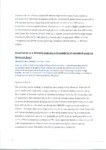Use este identificador para citar ou linkar para este item:
http://www.alice.cnptia.embrapa.br/alice/handle/doc/944903| Título: | Breeding programs and availability of non-GM IP seeds for farmers in Brazil. |
| Autoria: | CATTELAN, A. J.  |
| Afiliação: | ALEXANDRE JOSE CATTELAN, CNPSO. |
| Ano de publicação: | 2012 |
| Referência: | In: WORKSHOP ON MARKET FOR NON-GENETICALLY MODIFIED IDENTITY PRESERVED CROPS AND DERIVED PRODUCTS, 2012, Seville. Proceedings... Luxembourg, Eurpean Commission, 2012. Prepared by Pascal Tillie, Mauro Vigani, Koen Dillen and Emilio Rodríguez Cerezo. |
| Páginas: | p. 30-32. |
| Conteúdo: | Embrapa is the Brazilian Agricultural Research Corporation. It coordinates the national agricultural research system in Brazil and has for mission to provide solutions for the sustainable development of Brazilian agribusiness through knowledge and technology transfer. As such, it is involved in the development of GM and non-GM soybean varieties to provide farmers with the best germplasm they want. Soybean in Brazil: The area devoted to soybean in Brazil has been multiplied by about 60 in the last 50 years, while in the same time average yield has increased by 150%. Currently about three fourth of Brazilian soybean production is coming from only four States (by order of importance, Mato Grosso, Paraná, Rio Grande do Sul and Goías). In last years, the adoption of GM soybean by Brazilian farmers has still increased significantly, as it went from 62% of all soy cultivated area during the 2008/09 cropping season to 81% in 2010/11. However, there is an important variation across regions, since some States are still free of GM planting (e.g. Rondonia in the North, representing 1% of national soy production) and other are virtually integrally using GM soybean seeds (e.g. Rio Grande do Sul, 17% of national soy production). The most important States in terms of non-GM soybean production are Mato Grosso, Paraná and Goías States, which together accounted for about 70% of the non-GM soy production in 2009/10. Soybean breeding program of Embrapa: Embrapa maintains an important collection of soybean germplasm, including both GM and non-GM varieties, and constantly improves it in order to meet the Brazilian farmer?s most exigent needs. Accordingly, this germplasm portfolio includes cultivars with genetic resistance to the main diseases affecting soybean production in Brazil, notably the Asian rust, as well as varieties adapted to a second summer crop cycle, i.e. with early life cycle and resistance to higher rust incidence. So far, more than 200 cultivars have been commercially released. Nowadays, the attention of breeders is turning towards the genetic resistance to nematodes, an increasing problem especially where soybean is grown in monoculture or within short crop rotations. Another area of improvement is to breed cultivars more suitable for human consumption (higher protein content or low antinutritional factors, etc.). In the framework of the "Soja Livre" program that promotes non-GM soybean seeds and ensures their multiplication by farmers, Embrapa is regularly assessing the performance of its non-GM cultivars compared to control varieties. Results show that in their majority non-GM cultivars perform very well, across regions and over different cropping seasons. Farmers cultivating Embrapa?s non-GM varieties even won regional and national yield contest, reaching more than 6 tonnes per hectare i.e. about twice the Brazilian average yield for soybean. However, the main driver of GM soybean adoption is not about yield or cost difference, which are similar, but about easiness of weed control, certainly an area where GM soybean owns a clear advantage. Embrapa policy regarding non-GM soybean program Embrapa considers the maintenance of the non-GM soybean breeding program as a strategic issue, notably to meet existing farmers? demand for non-GM IP seeds (including organic seeds) not covered by other companies. Indeed, most of the private seed companies had discontinued their conventional breeding programs but now start to commercialize non-GM seeds again, following Embrapa?s initiative. Additionally, Embrapa policy is to maintain high quality germplasm available, even for genetic transformation. Many genes of minor interest for private seed companies are nevertheless of great interest for farmers or for consumers. An additional important justification for Embrapa conventional soybean breeding program is the concerns about herbicide-resistant weeds, a problem intensified by the use of GM glyphosate-tolerant soybean. A proper management of weed resistance is essential to maintain the sustainability of farming systems. Tackling successfully this issue requires to keep a minimal market share for non-GM IP soybean, in order to ensure the profitability of conventional breeding program and chemical products research and development, that are essential for the management of the resistances. In the absence of market for non-GM soybean, many private companies will discontinue their corresponding research program. For these reasons, Embrapa is committed to promote the non-GM IP soybean production and to keep up with its conventional breeding program. To conclude, Embrapa stressed that price premium are essential for farmers to keep cropping non-GM soybean, otherwise its market share will fall down. |
| Thesagro: | Soja Planta transgênica |
| NAL Thesaurus: | Soybeans Transgenic plants |
| Tipo do material: | Artigo em anais e proceedings |
| Acesso: | openAccess |
| Aparece nas coleções: | Artigo em anais de congresso (CNPSO)  |
Arquivos associados a este item:
| Arquivo | Descrição | Tamanho | Formato | |
|---|---|---|---|---|
| ID34048.pdf | 1,88 MB | Adobe PDF |  Visualizar/Abrir |









